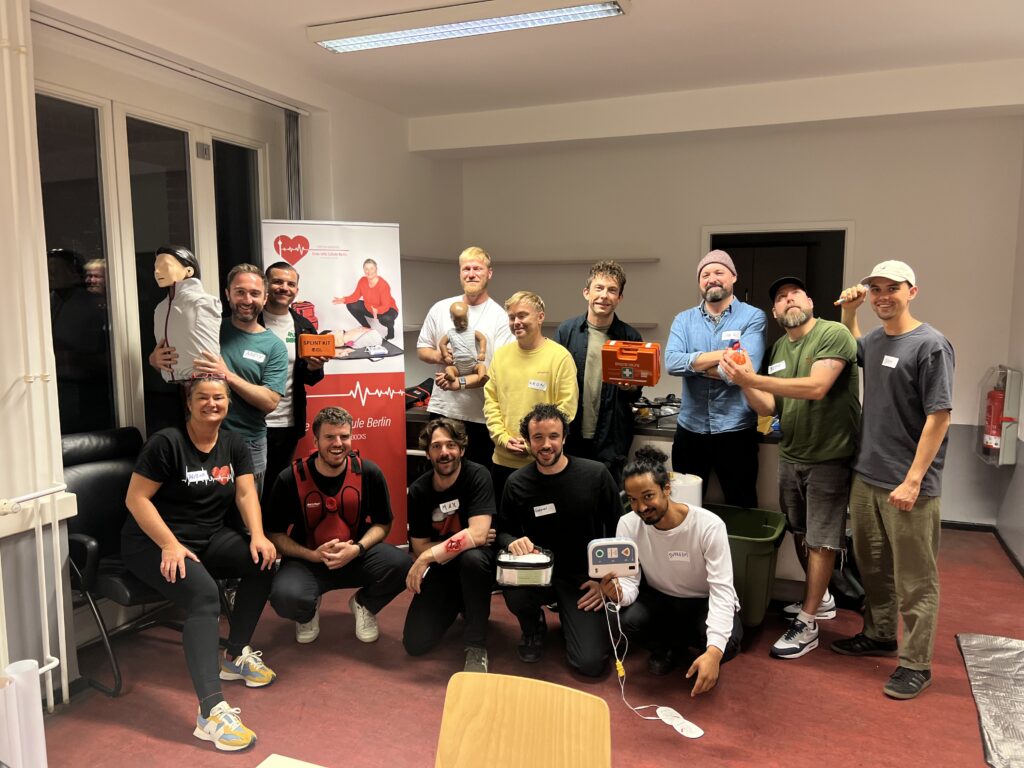Hybrid first aid course for pupils & clubs
- Simple online registration.
- With practical exercises.
- Certificate included.

First aid course for for trainers and carers
First aid in clubs is an important part of safety precautions in order to be able to react quickly to accidents and injuries during sporting or other community activities. In many clubs, especially sports clubs, there is an increased risk of accidents, which is why basic first aid knowledge is very important for trainers, supervisors and members.
Contents at a glance
First aid measures in the event of accidents
Trainers and coaches should regularly complete first aid courses in order to be able to act in an emergency. These courses teach basic measures such as wound care, the recovery position and cardiopulmonary resuscitation. They also practise how to deal with sports injuries such as sprains, bruises or broken bones.
First aid material
Clubs should always provide well-equipped first aid kits that are easily accessible in centralised locations. These kits should be checked regularly and replenished if necessary. It is also a good idea for sports clubs to have an automated external defibrillator (AED) on site so that they can react quickly in the event of a cardiovascular arrest.
Special sports injuries
Specific knowledge is particularly important in sports clubs, as injuries such as pulled muscles, torn ligaments or concussions are common. It is important that carers know how to deal with such situations and when professional medical help is needed.
First aid for children and adolescents
Many clubs look after children and young people who react differently to injuries or accidents than adults. First aid skills that are specially tailored to children help them to act calmly and correctly in these situations.
Accident prevention
First aid in clubs also includes preventative measures. These include regularly checking sports equipment and facilities for safety, adhering to rules to prevent accidents and warming up before sporting activities to prevent injuries.
Emergency management
Every club should have a clear emergency plan that regulates who takes on which tasks in the event of an emergency. This also includes informing members about the location of first aid equipment and emergency numbers.
Duration
<span data-metadata=""><span data-buffer="">Dates
<span data-metadata=""><span data-buffer="">Location
12439 Berlin
If required, we also offer in-house training courses directly at your company.
Costs

Safety starts with knowledge
We not only offer formal training, but also give you the confidence to act correctly in an emergency.
FAQ (Frequently asked questions)
How long does a course last?
Our first aid courses usually last 9 teaching units (45 minutes each) and offer a balanced mix of theory and practical exercises.
Will I receive a certificate?
Yes, after successful participation in a course you will receive a official certificate, which confirms participation and the content taught. This certificate is DGUV-compliant and fulfils the legal requirements.
What if I have no previous knowledge?
No problem! Our courses are for participants of all experience levels suitable. Our experienced trainers convey all content in an easy-to-understand and practical way so that you are optimally prepared.
Is the course DGUV-compliant?
Yes, our courses comply with the current DGUV guidelines and fulfil the requirements of the employers' liability insurance associations and accident insurance funds. Our DGUV authorisation number is 8.2083.
DGUV-compliant first aid training requires the completion of 9 teaching units of 45 minutes each in classroom format. This ensures practical training and compliance with all legal requirements.
Can courses also take place in my company?
Absolutely! We offer in-house training courses and come directly to your company. This saves time and enables flexible customisation of the content to your individual requirements.
Location
Contact us
"*" indicates required fields
Blog
The digital classroom for first aid training: 4 advantages
Digitalisation has not only revolutionised our daily lives, but also the way we learn. Even in
Why is first aid important?
Accidents in all areas of life such as household, work, road traffic, leisure and sport are part of everyday life! Until the professional rescue service arrives
